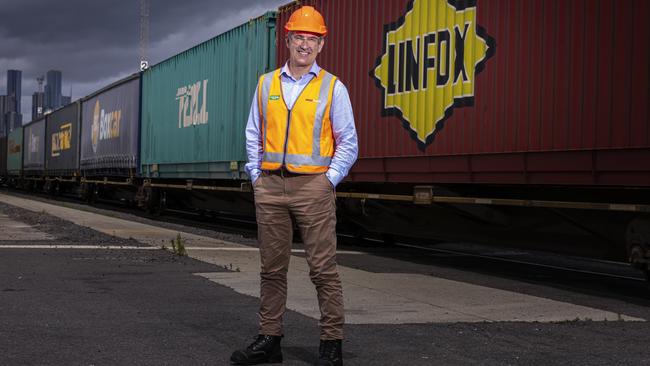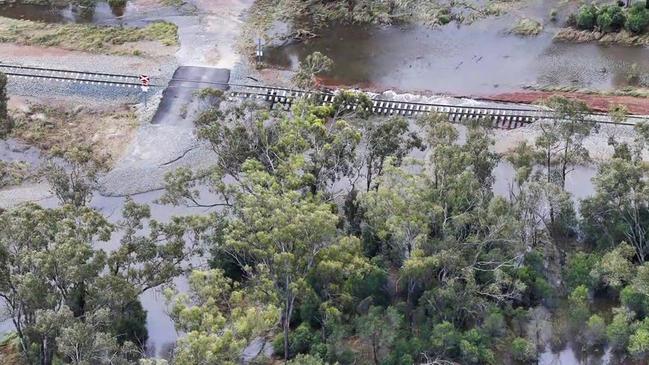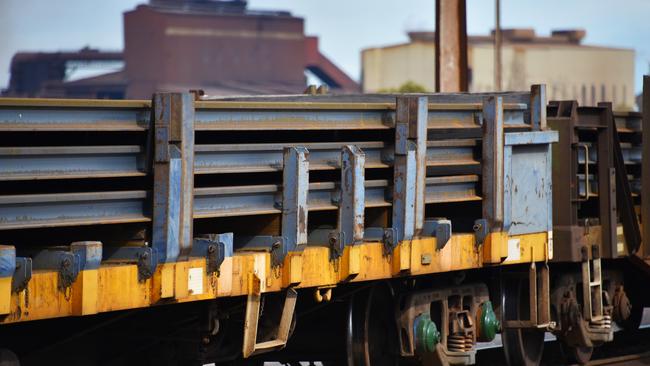Pacific National boss Paul Scurrah says rail freight must ‘pinch and scrape for every cent’
Pacific National chief Paul Scurrah says large sections of the interstate and regional railway system need a significant upgrade after years of neglect.
The chief executive of the country’s largest rail freight operator has warned that “large sections of our interstate and regional railways are in urgent need for major upgrades” after years of neglect.
Pacific National boss Paul Scurrah said state governments and the commonwealth could “no longer neglect the condition and resilience of our interstate and regional railways”, with several key sections of the national network knocked out for weeks on end as a result of poor weather last year.
“Each year, billions in funding is hardcoded in federal and state government budgets to upgrade roads and highways, which then spurs on greater access for bigger and heavier trucks,” he said.
“Meanwhile, rail freight must pinch and scrape for every cent.”
The country’s freight rail network is largely operated by the commonwealth-owned Australian Rail Track Corporation, although some parts are managed separately by state authorities.

One section of track managed by the ARTC, between Parkes and Broken Hill in NSW, has been closed since late October and is not scheduled to re-open until late January, which has meant all east-west rail freight services have been re-routed through Melbourne, where the network is congested and the track must be shared with passenger rail services.
An ARTC update for stakeholders, circulated in November, noted “limited capacity” on the Melbourne route.
“Ongoing flooding events continue to see water levels rising. Track inspection and repairs can only commence once water levels in the rail corridor recede significantly, and the duration of repairs will be dependent on the damage sustained,” the update read.
Another part of the network managed by the ARTC, from Moss Vale to Unanderra – a suburb of Wollongong – was closed from March to October, or 209 days. That line is used to deliver grain and coal to the Port Kembla terminal and used by Manildra’s Shoalhaven Starches, the largest wheat starch and gluten plant in the country.
Early last year, another major corridor – the ARTC-operated line from Port Augusta to Tarcoola in South Australia – was closed for 24 days and estimates suggested the economic impact was $320m.
The Port Augusta to Tarcoola line, one of the primary links between the capitals on the east coast and Perth and Darwin was closed after significant flooding damaged it at 18 sites across 300km.
The ARTC was forced to close the Hunter Valley network in July after heavy rainfall, preventing access to the Port of Newcastle, while the NSW-run Blue Mountains line, which is used to move grain and coal to Botany and Port Kembla, was closed for 41 days last year after major landslips in the area.

Mr Scurrah said Pacific National was working around the extended closure of the track from Parkes to Broken Hill, but the route through Melbourne took an extra 16 hours, which was “leading to additional costs in labour, fuel and access charges”.
“In the meantime, some customers have been forced to divert their freight from trains to trucks or foreign-owned cargo ships,” he said.
“Imagine the understandable outrage from communities, commuters, and the trucking industry if the Pacific, Princes, Hume, Newell, Great Western, New England, Bruce, Eyre, or Stuart highways were closed for months on end.”
An ARTC spokesman declined to comment, but noted the organisation had spent some $9bn on its network over 15 years. The ARTC has also been tasked by the federal government with helping to deliver the Inland Rail, for which it has been given $14.5bn.
After years of planning, the Inland Rail opened part of its first phase in early December – from Narrabri to North Star.
But there is acrimony over that project. The federal government has appointed former Energy Security Board chair Kerry Schott to lead an inquiry into the project, which has been hit by cost blowouts and a dispute over its exact route from Brisbane to Melbourne. A timeline to complete the project announced by the Coalition by 2026 was described by Infrastructure Minister Catherine King as “a lend”.
“In every state, there are significant problems around, whether environmental approvals, environmental offsets or the alignment,” she told The Australian in June.
“There was a lot of focus on getting announcements out the door and looking to be seen to be doing things,” she said of the previous federal government.
One report, prepared by a Senate committee in 2021, suggested the project could cost more than $20bn by the time it was finished.
Ms King’s office on Sunday said the government “recognises the unprecedented impact of recent flooding on the operation of freight rail networks”, adding that the ARTC had last year allocated an additional $170m toward network resilience investments.
“The government is also investing in numerous upgrades to ensure the productivity, safety and reliability of the ARTC network,” she said.

Mr Scurrah, the former chief executive of Virgin Australia, said there had been “many decades of chronic government underfunding” of the freight rail network.
“Increasing volumes of bulk freight like grain, minerals and shipping containers are being transported by trucks, not trains, due to substandard rail infrastructure,” he said.
“When freight shifts from rail to road, it’s Australians who ultimately pay the price. Communities suffer increased traffic congestion, vehicle emissions and road accidents.
“Taxpayers and ratepayers are forced to fork out more money to repair and maintain roads and highways.”
Mr Scurrah said the freight rail issues would also affect the cost of groceries, “adding to the financial pain (families) are feeling from inflation and rising interest rates”.
“Australian rail freight companies are some of the best in the business but the condition of the track infrastructure is letting operators and their customers down,” Mr Scurrah said.
Pacific National was owned by Toll Holdings and Patrick, before becoming part of Asciano when it was separated out of Toll and listed on the ASX. In 2016, it was acquired by a consortium which included Global Infrastructure Partners, CPPIB, the China Investment Corporation, Singapore fund GIC, and British Columbia Investment Management Corp.



To join the conversation, please log in. Don't have an account? Register
Join the conversation, you are commenting as Logout